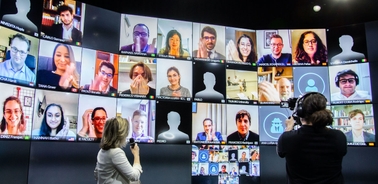- Home
- We Are Law School
- News
- Students From Tilburg University Win The First Comparative Law In Action Challenge
Students from Tilburg University win the first Comparative Law in Action Challenge

Students from top law schools participated in this year’s Comparative Law in Action Challenge. The final and closing ceremony, held virtually at IE’s Wow Room, unveiled this year’s winning team: Tilburg Law School, who not only won the challenge but have also received the best group oralist award.
In the first IE Comparative Law in Challenge, students of top law schools around the world participated to find comparative law solutions to social unrest challenges facing ‘Lalaland’. Participating Universities included Edinburgh University, Tilburg Law School, Maastricht University, FGV Brazil, and Bocconi University.
Tilburg Law School’s team consisted of third-year Global Law students Reuben Hofman, Nicolas de Laparre de Saint Sernin and Hanna Verberne, and fast-tracker Lucy Wen. The team was coached by Ph.D. researcher Shanya Ruhela. The winning team is invited to this year's Summer School at IE University, Madrid.
'To win the Comparative Law in Action, it is required to focus on the detail, to conduct thorough research, not to neglect the soft skills, to work hard, to set an intelligent strategy and to have luck on your side. The members of the Tilburg University team have done a fantastic work. Congratulations!’, said Antonios Kouroutakis, Professor of Constitutional Law at IE Law School, and designer of this year’s Comparative Law in Action challenge.
Cristina Garcia, General Director Of Orange Spain; Hugh Elliott, Ambassador Of The United Kingdom To Spain; Jan Versteeg, Ambassador Of The Netherlands To Spain; Maria-Elena Aguero, Secretary General Of Club De Madrid and Roberto Nocella, First Counsellor Of Italy To Spain, were part of the jury.
About the challenge
The Comparative Law in Action is the first competition of its kind, bringing together students from top law schools and challenging them to work on a multimedia case in a largely virtual environment. Mirroring the methods of tomorrow’s legal teams, they have to apply a comparative legal mindset to reach an innovative, all-encompassing solution.
During the past two months, participants studied and analyzed how law and policy adapt to new dynamics created by technology, while also leveraging its power to present solutions to legal challenges. Through a practical and immersive real-world multimedia experience, students learned how a comparative law approach can create innovative solutions to today’s pressing global issues.
In this first edition, students dealt with social unrest in the fictional country Lalaland. Throughout the case, students confronted questions and issues related to the electoral system. Along the way, other challenges arose, including the use of technology in ensuring accurate electoral results, as well as the regulation of disinformation.